Two Ukrainian mothers raising their children in bomb shelters share their stories this Christmas
"I will miss our home. Everyone should be home for Christmas. But we are waiting for peace and safety and hoping that this will be over soon."
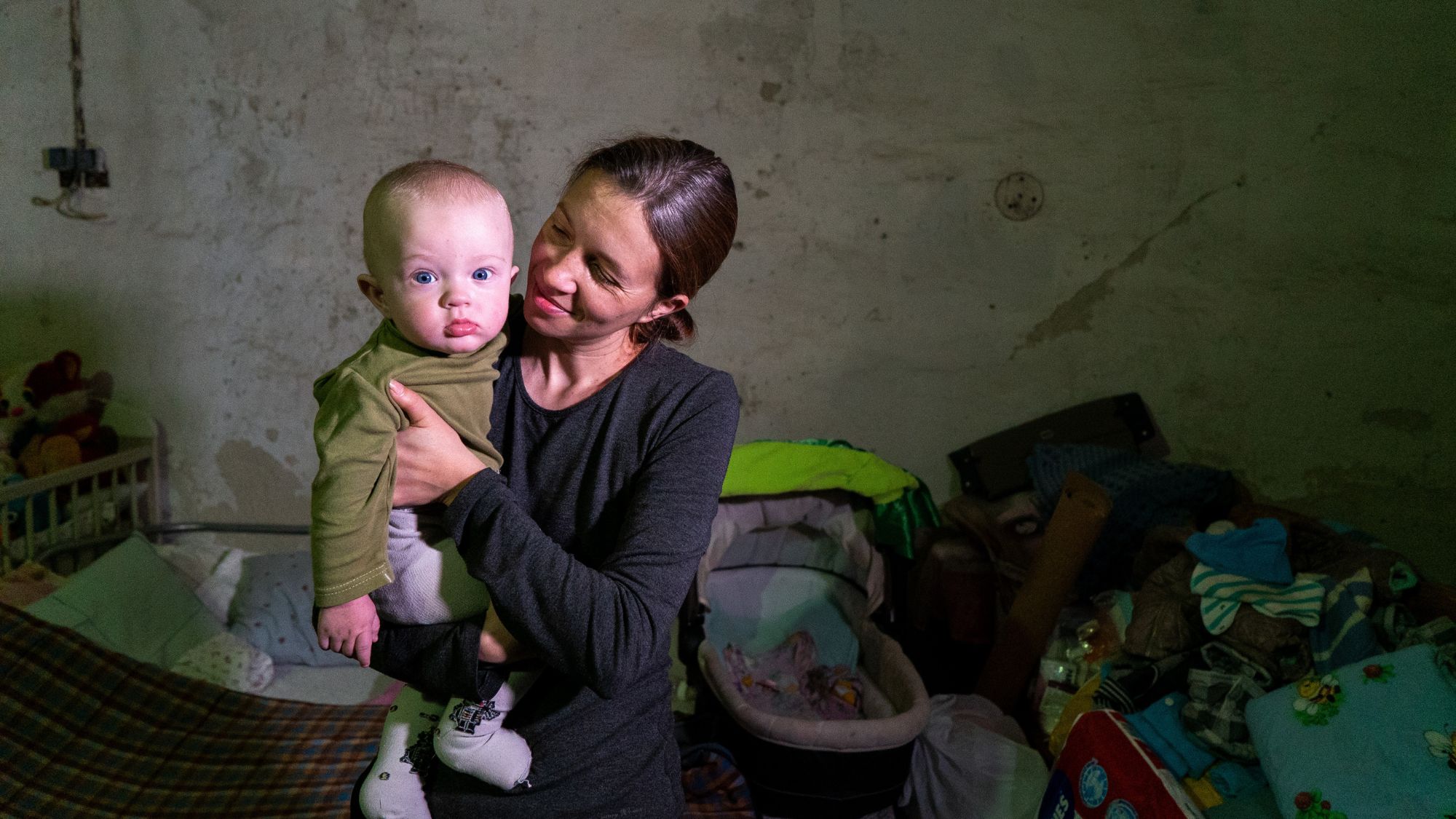

The war in Ukraine has triggered the largest refugee crisis in Europe since World War II. And as a result, millions of Ukrainian women and children will be spending this Christmas far from home, familiarity and loved ones.
Almost 8 million people from Ukraine have fled to European countries and within Ukraine 6.5 million people have fled their homes and are internally displaced in bunkers, facing a harsh winter of freezing temperatures and blackouts.
This is the reality for Mavka* and Yulia*, two Ukrainian mothers who are among those living in bomb shelters in Kharkiv, and have been since the conflict began in February.
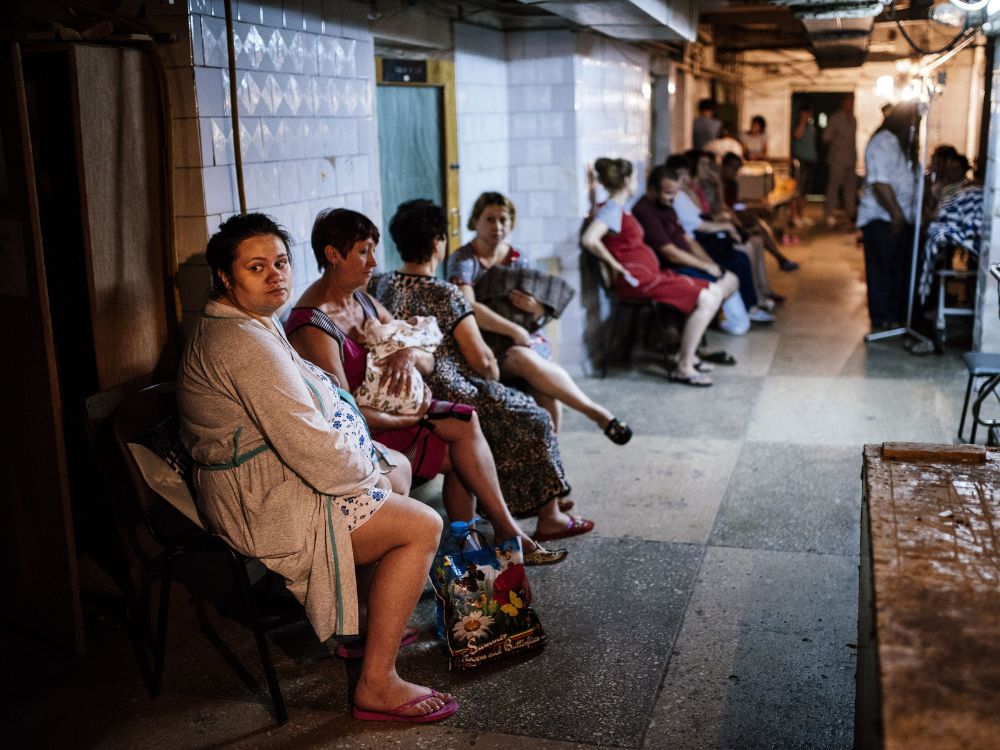
This Christmas, they share their accounts of raising children and building a community underground. This they explain they couldn't have managed without the invaluable support they have received from Depaul and funds from Disasters Emergency Committee (DEC).
The British public has now donated a staggering £390 million to the DEC Ukraine Humanitarian Appeal, supporting displaced people on the ground with warm blankets, generators, repairing damage to shelters, and providing psycho-social and education support to the children.
"We had a normal life before this, we had everything," explained Mavka. "A year has nearly passed now and kids are growing up in these basements, but there is hope here, and as they say, hope dies last. We won’t give up. You realise that what’s important is what you have now, not what you used to have. This is what support gives us. I don’t know what we would do without them."
This Christmas, here are Mavka and Yulia's stories...
Marie Claire Newsletter
Celebrity news, beauty, fashion advice, and fascinating features, delivered straight to your inbox!
Mavka's story
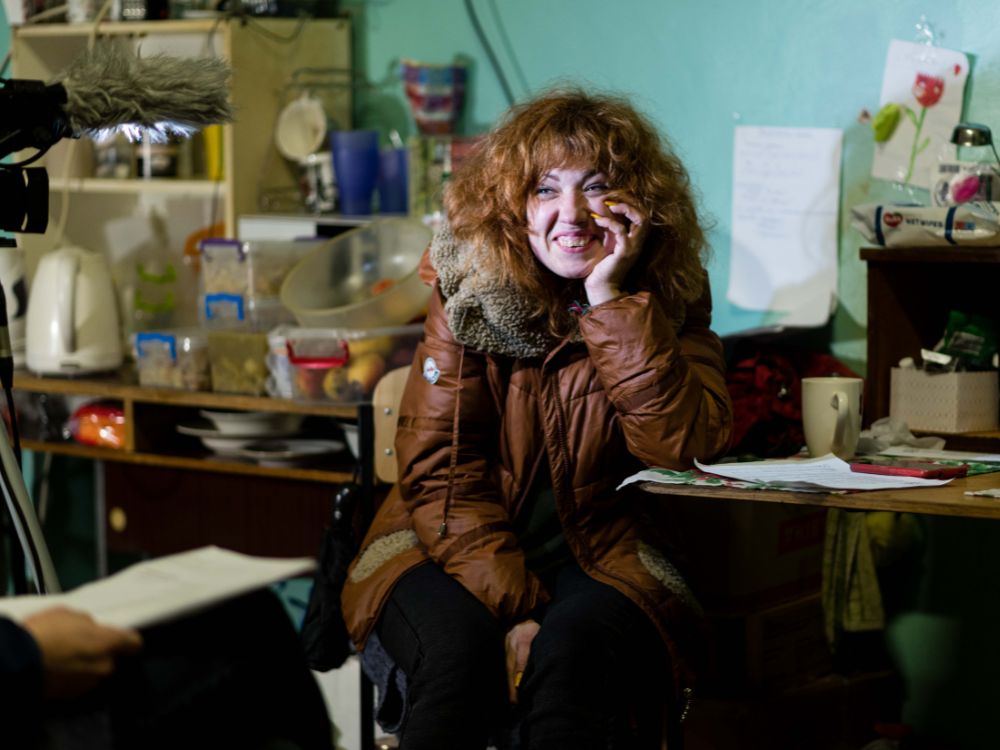
My name is Mavka*. I am 39 years old. I have an 8-year-old daughter, Olesia*. Before the war we had a normal life, we had everything. Despite having a disability, I had my own business and my own shop, but the street it was on was bombed and it burned down with everything inside. Olesia* was in the second grade before the war started and I had invested a lot in her education. I really wanted her to achieve something in life.
For some time before the war, we were already living in fear. Then on 24th February - a date I will remember for the rest of my life, I woke up at 6am to get ready for work and I heard an explosion, a sound like we’ve only ever heard in films. It was impossible to describe the feeling - an animalistic fear, one that shakes you from the inside. You don’t know what to do except to run. I grabbed a backpack and filled it with a two-litre water bottle, our passports, medicine, a piece of sausage and bread. I realised I couldn’t physically take anything else because we needed to run. I woke Olesia* and explained what was happening. We quickly dressed and went outside as the explosions got louder.
It was a long walk to our nearest bomb shelter but we were lucky that we knew where to go. Out on the street everyone was running, and parents were holding children so they wouldn't get lost. When we reached the shelter there were a lot of people. I was holding onto Olesia* just so I didn’t lose her in the crowd.
Once we settled down we made makeshift “beds” out of chairs for the children but we adults sat on paperboards on the ground, trying to hide our fear from the kids. We could hear the bombing from the street and I just kept drinking water to hide my fear, until I realised I needed to ration it.
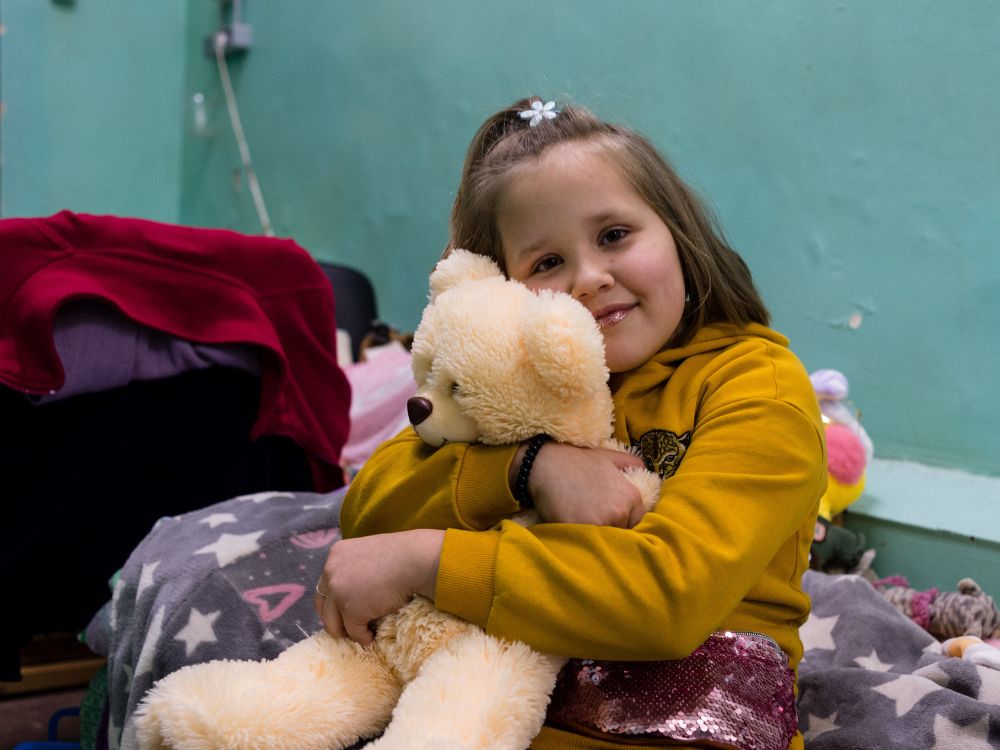
We stayed in that shelter until the explosions stopped and it felt safe to go back home again. We thought the nightmare had ended but just as we got home it all started up again. We ran back to the shelter but our seats were gone and we struggled to find space to sit down again. We knew this wasn’t sustainable so some of our local friends we’d found there went looking for another shelter, and this place here is the one they found.
It’s not exactly a shelter, but it’s deep underground. There were so many people here and some brought their pets with them - cats and dogs. Everyone brought the most important things to them. Olesia* brought lots of games and books from home, she brought everything she could. I brought our hamster and our canary bird. On the third day here someone brought mattresses, and we shared three between eight of us. It was still winter so it was cold and we were all sleeping in our clothes and hats.
I had my birthday on the 30th march and my Mum managed to find a cake, but we gave it all to the children - we could barely eat. It felt more like a funeral than a celebration, and the explosions were continuous.
We became friends with Iris* and her sons and we started to think about where we could get food. We had some money but it was useless - there was nothing left in the shops. And even if there was something, we felt it was too dangerous to walk there. What if something happened to you, and your child was left alone in the shelter?
Iris* started making calls to volunteer organisations but they kept saying “yes, we’ll help you, but not now whilst it’s too dangerous.” When will it not be dangerous? In a week? A year? We couldn’t live with the uncertainty of that.
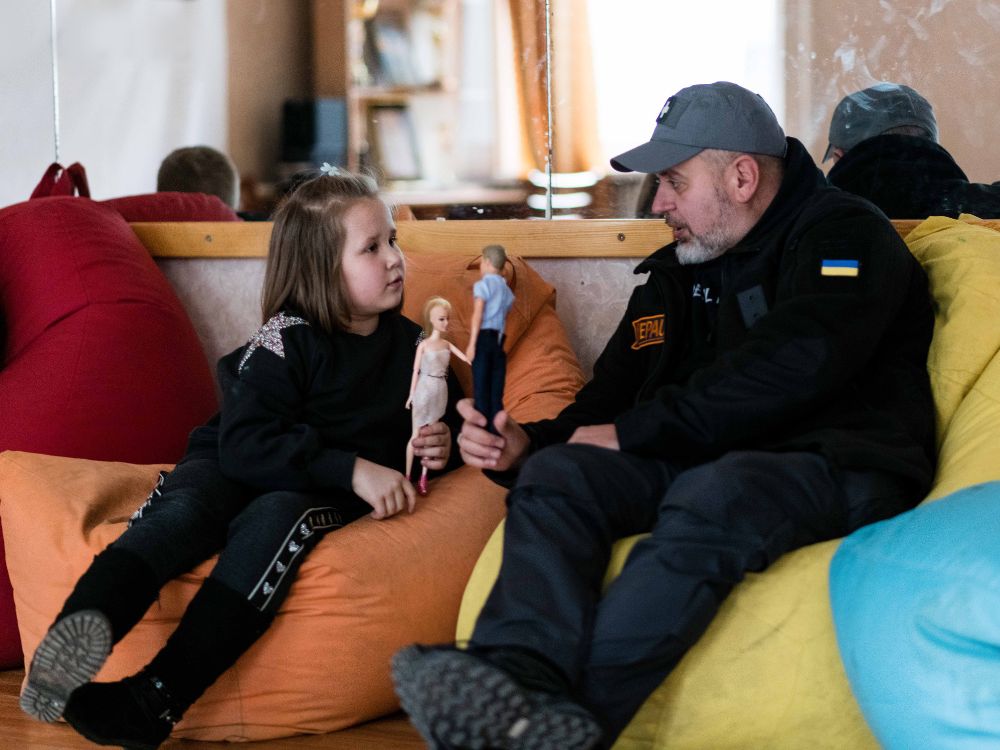
Finally, Iris* got hold of the Depaul number. They simply asked, “Where are you? How many people are there? What do you need?” We couldn’t believe someone was actually going to come, but they did. They came and assessed how much help we needed, to check on our wellbeing and the wellbeing of our kids.
Olesia* didn’t understand what was happening. She wasn’t able to manage her stress and was shaking a lot, not knowing what to do. I’d just manage to calm her down and get her back to sleep and then the explosions would all start up again. This had been going on for three months.
When Depaul came back they brought hot meals, and our kids could eat. Slowly we all came to our senses - we realised that someone was helping us, and that we were not abandoned.
As they came to us through explosions and bullets, we started to pull together. We began managing the distribution of food here, and started calling others outside to come here for support as well. They couldn’t believe it either. And as we shared out the food, everyone started to come to their senses and think differently - they weren't as scared anymore. We all realised that we weren't alone.
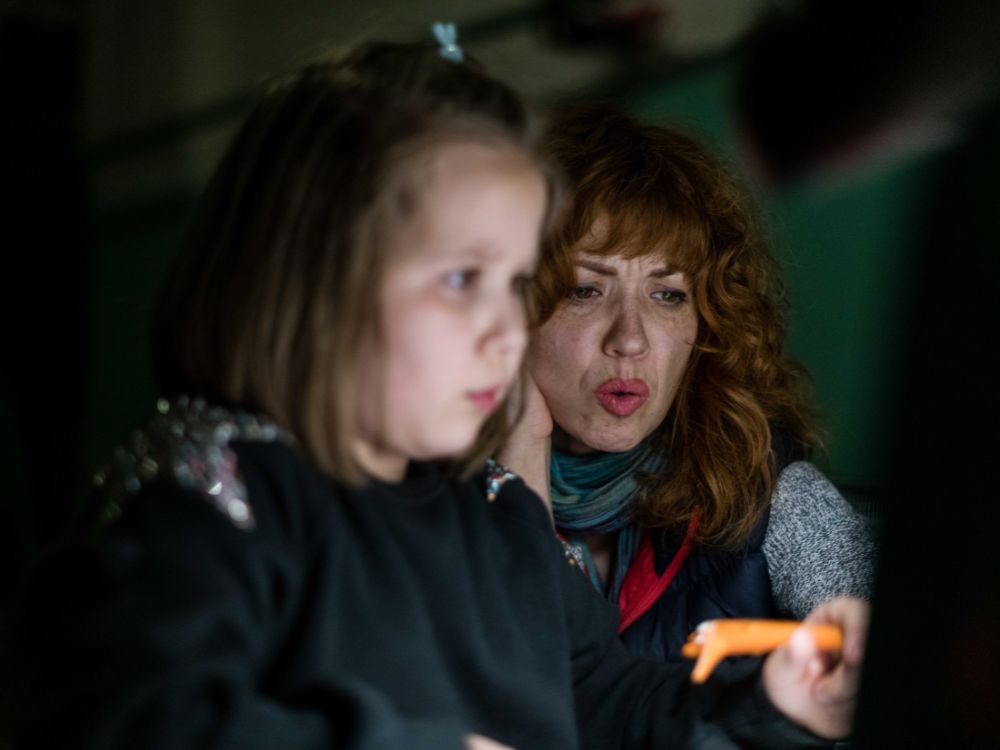
That’s how we started our life here. People united and it wasn’t just me and Iris* anymore - we had a team. We got organised and started distributing the help from Depaul to people who came here with nothing. Helping other people helped us to survive.
Olesia* hadn’t been outside for two months but thanks to Depaul, a team of therapists came to us and helped the children get better. They helped them learn to accept and face this fear. Yes, the war has started but we need to face it and carry on, and little by little, Olesia* started to go outside again. The psychologists still help us and the children are always excited to see them.
We understand the kids need a daily routine so we wake up at 7am, wake the kids at 8am and get them fed and ready for online school lessons at 9am. Online education has been very hard because sometimes we haven’t had electricity - we can’t charge the tablets so they can’t see or hear their teacher. Whilst Olesia* is in primary school I can help her, but it’s such a struggle for the older kids. This place is a salvation for me. We have electricity here so there’s an opportunity for our children to have an education - the school year has started and Olesia* is now in the third grade. There is hope for our kids’ future here now - they can continue learning so that they can have a better life.
We celebrate birthdays here when we can. A year has nearly passed now and kids are growing up in these basements, but there is hope here… and hope dies last, as they say. We won’t give up, and we believe that everything will be over soon. You realise that what’s important is what you have now, not what you used to have. You find new values in life. This is what support gives us. I don’t know what we would do without them.
Our kids are the most important thing to us - our struggle is for them. Our lives have been divided into before and after. You didn’t know what war was, you’d only ever known it in films, and in reality it can only be understood by the people who experience it - the explosions, the primal fear.
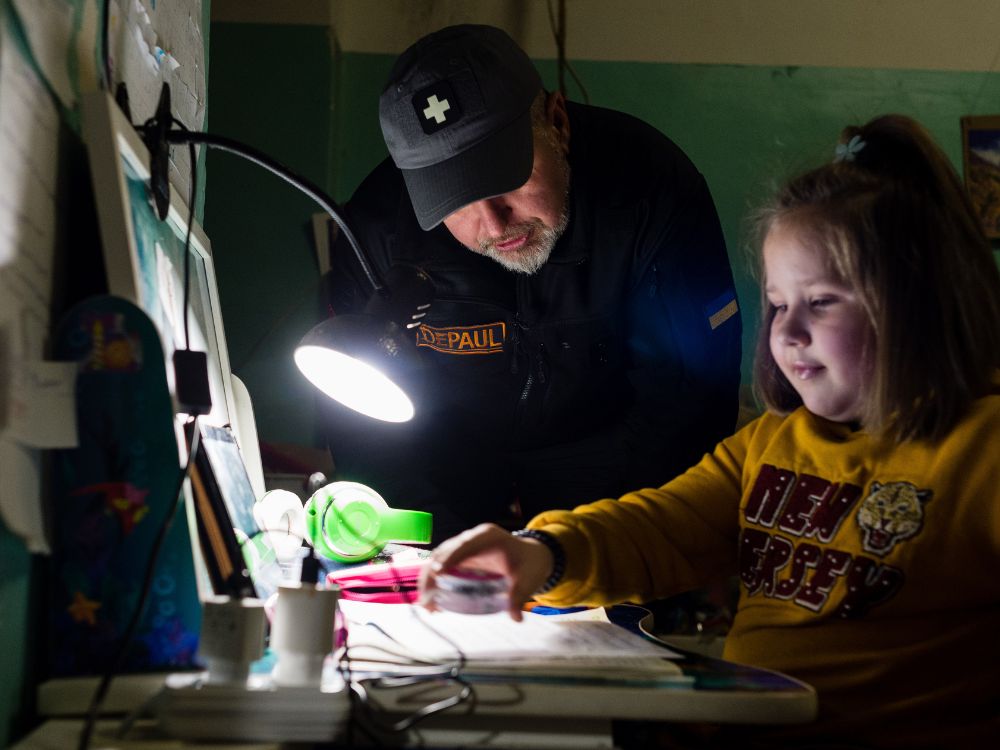
Depaul has helped so much. They brought us warm blankets - even though we sleep in our clothes we always use those blankets. They brought toothbrushes, toothpaste and other hygiene items. We have water in the taps and thank god, we have electricity! It might seem like nothing but it is all so necessary. Now we can warm the water up to wash our kids. We are so grateful for the support and that the organisation exists.
I’d like to share with others that we also had a normal life before this. We had everything, we didn’t need any help. We never expected anything this horrible to happen to us. War damages everything, it takes away your life, and it takes away your future. People who live a normal life never expect this, that’s why this help is needed.
Kharkiv is our home, and we love it a lot, we feel pride for it, and this city is still standing. We don’t know what the future will hold but we have hope that the war will end. We hope the New Year will bring us peace. Maybe next year peace will come.
Yulia's story
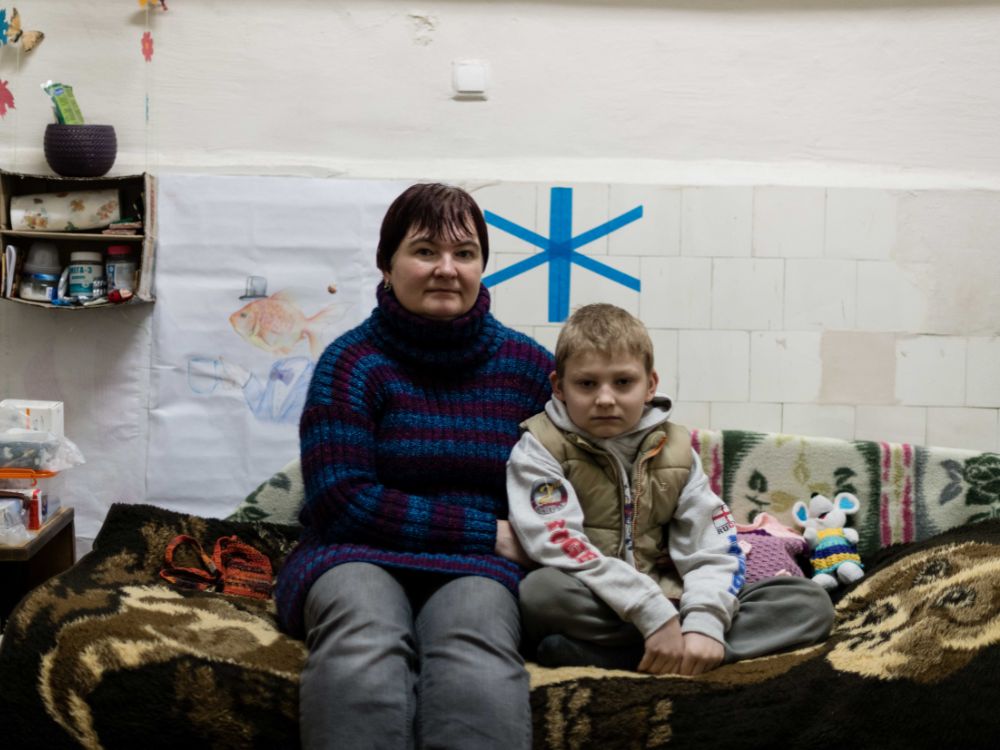
My name is Yulia and I am 49 years old. I have lived in Kharkiv since I was born and I worked as a physics and maths teacher. I have two children, the older one is 14 years old, and he is studying in the ninth grade, and the younger one will soon be 8 years old and is in the second grade. Life used to be beautiful - each day was planned. My children would go swimming, take drawing lessons and do other sports, as well as visiting our holiday home on the weekends.
On February 24, everything went wrong. We woke up at 5am from explosions and noise, and we looked out of our windows to see that Kharkiv was burning. We were in shock. We collected our documents, woke up the children and sat in the corridor, because the explosions were getting closer and louder. It was very early in the morning and we didn’t know what to do or where to go - we weren’t ready. We realised it wasn’t safe to stay in our home so we got the kids dressed, gathered our documents, and went looking for a shelter.
Our first shelter was in the basement of our apartment building. It was only half a metre underground with no lights, no heating - nothing. We spent 24 hours in this basement, standing with our bags. Just standing. The kids were desperate to sit down to get some rest. We spent 24 hours living on water and cookies until we realised that the children couldn’t handle it any longer.
We returned home in the evening, hoping it was over, that it was just a bad dream. We fed the children on what was at hand and went to bed. I couldn’t sleep - I was waiting for something else to happen, and it did. The shelling started again so I got out of bed, took the kids to the corridor and we lay on the floor. We spent most of the night there. By morning it hadn't stopped, so we took the kids, our bags, documents and a little something to eat, and we went down to the basement where we stayed for another day, also standing.
We could not believe this was happening to us, to our children, in the 21st century. We spent 6 days hiding in different basements in our building. When a missile landed next to the first basement the door was destroyed and the entrance was blocked, we were so relieved we’d left when we did.

The basements were cold, damp and without light. I didn’t sleep for a week. We would return to our home for a while to get some rest because it was so difficult to stand all day. One night I heard a plane fly over our home, but when I realised it wasn’t a plane but a missile, I knew that next time it could land on our building. I knew we needed to go somewhere where we could be safe, where the kids could sleep without being scared, so we left. The closest shelter we found was here. It is deeper and more secure with strong walls. Two days after leaving the basement there was a bombing right next to it. I’ve thought a lot about that.
My whole family came here together, me, my husband and our two kids. When we came here we were so happy they let us in. We came with two small bags and we slept together in a cuddle, holding hands, knowing that we were finally safe. I managed to get some sleep after a week or so, once I knew that my children were safe. I still keep my kids close to me at all times - they are the most precious thing in my life.
I came here looking for safety. A lot of people wanted to leave and some of them did, but leaving didn’t feel safe. We would hear of a lot of bad things happening on the roads - people who tried to leave but didn’t make it. It stopped me from going anywhere. We had to find somewhere near enough to home, but safe.
It is impossible to live at our home now. It’s completely destroyed, with no heating, light or gas. The floors are demolished. Everything we did to make a comfortable home for our kids there is all gone. We’re just grateful that we’re here together and that we’re still alive.
Here we have made a lot of new friends and acquaintances, and we all support each other as much as we can. We have established comfort, society and life here - although I don’t think I could call it “life”. Life in a basement isn’t life. I really want to go home but we are grateful that we are here together and alive - it gives us hope. Our attitude to life has changed a lot.
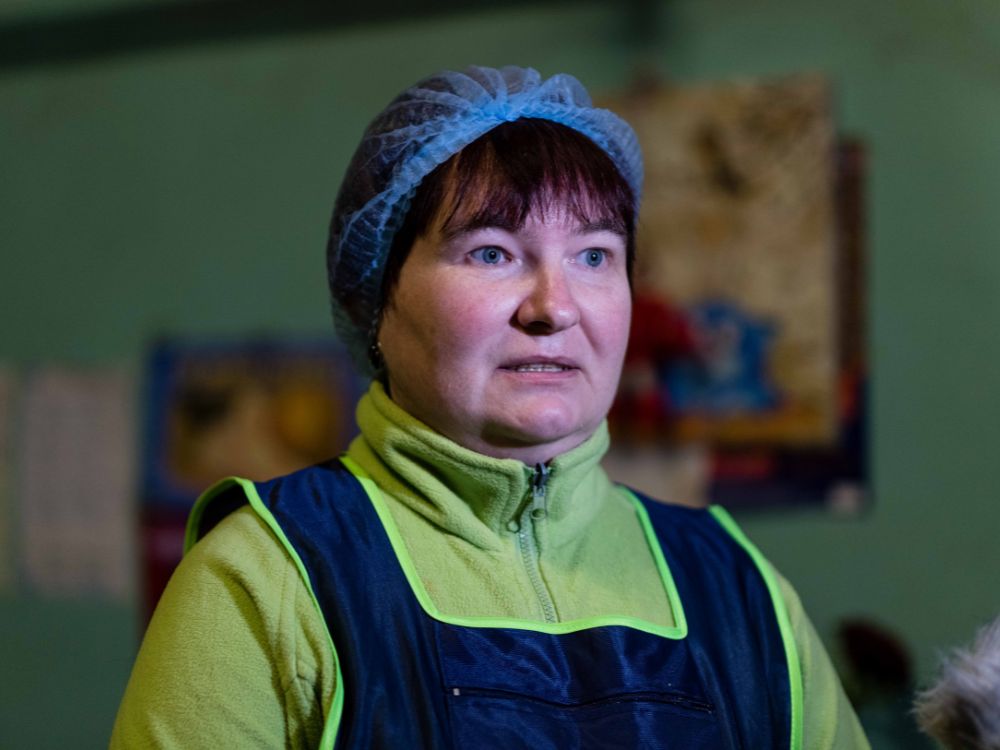
Back in the beginning, we went for days without food. For adults that’s not so bad, we could survive on water, but our kids needed food. I was scared, thinking “How am I going to feed my kids?” Depaul was the first organisation to react to the fact that we were here without any food or water, and that we had children with us. We finally got some of our basic needs met. We’d slept on paperboards at first but now the shelter is furnished with blankets, pillows and beds made from stools. They made us beds to sleep on - the children were so happy, and then they even gave out sweets - pure happiness.
We were so grateful for the help. Everyone around us was so generous and everything was shared - it changed our attitude to life. We realised that we were stuck here and needed to make the most of it. We would go home between bombings and retrieve books, pens, and paper, so the children could study, and we shared everything that we didn’t need - the bare minimum was enough for us.
I think Depaul’s volunteers and staff are heroes. When we couldn’t go outside at all, they would bring us what we needed through the bombings, and they’d continue to organise support. Hiding down here we have safety, but they don’t. Outside, they risked their lives to provide us with food, water and other necessary items. There are no words to describe how grateful we are to Depaul and Father Vitaliy. We are so grateful that we survived during that time.
Some of the most important help we have received from Depual is psychological. It is hard to live through bombings, and hard to manage those feelings on your own. Thanks to the help of their therapists we are managing it. They work with us adults as well as the kids - they’ve helped distract our kids from the reality of our life here. They keep them stimulated through drawing together and playing movement games.
One of our biggest challenges here is a lack of electricity. The children are trying to continue their education online here but when the power goes out for the whole of Kharkiv, we are plunged into complete darkness because we’re underground. One week we went three days without any power. It is hardest for my eldest as he needs to be online more for school. We really need electricity generators for situations like this.
My husband went back to work in March which was extremely hard, but over time I’ve gotten used to it. Each day starts with me walking him outside and ends with me greeting him at the entrance.
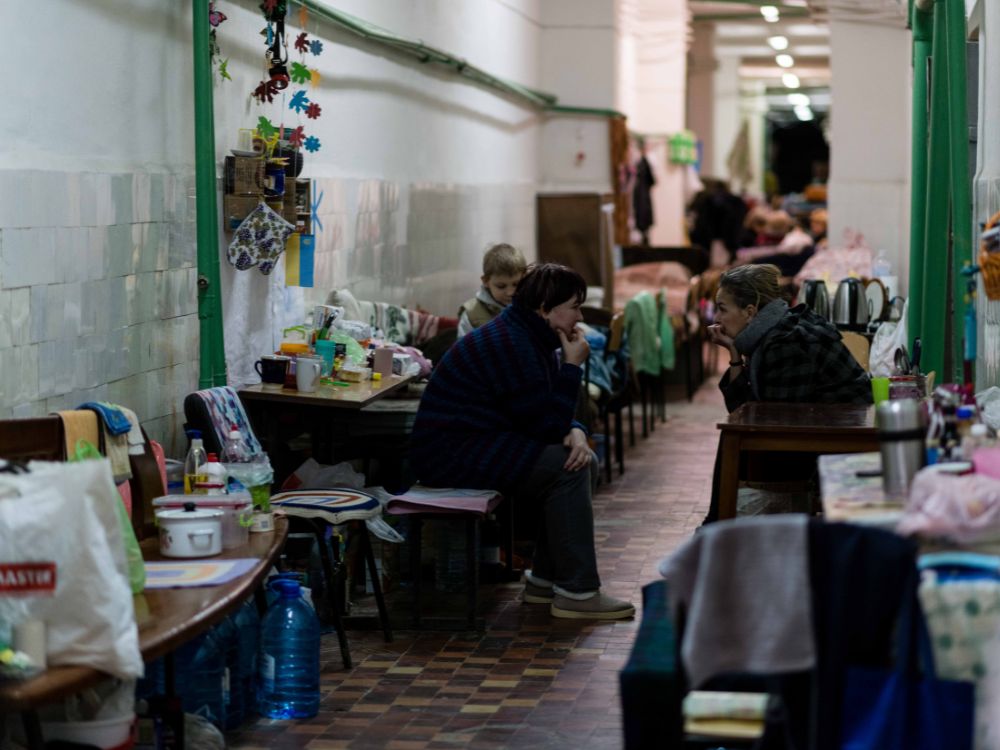
We’re not ready to leave. We know we only have one life. We don’t have that many needs - food, electricity, heating, and the most important thing - safety. It’s worrying how cold and frosty it's going to get in the coming months. But we know we’re going to get help now and that we are not forgotten, so here we hope we will get through the winter and continue to have a warm place to stay. It couldn’t be described as a home here, but at least we are one big family.
For Christmas we hoped to do something. Depaul might help us by bringing some nice food, hopefully something hot. Tea and sweets we can provide ourselves and we will play some games - it is going to be creative. But I will miss our home. Everyone should be home for Christmas - it’s a holiday, and you should feel that home comfort. We are going to miss it. But we are waiting for peace and safety and that this will be over soon.
I am so grateful for the people that have helped us. It is not just about the help; it is about understanding and compassion. I would personally like to thank Father Vitaliy and Depaul. Words cannot describe how grateful we are.
The friends that we have made here will stay in touch forever. They will always be a part of our heart, our soul. But I would like to move back home. I hope one day that this will end.
Visit Disasters Emergency Committee for more information on the DEC Ukraine Humanitarian Appeal and how to donate.
DEC funds are helping Depaul provide generators, carry out winter repairs, and provide warm blankets to a public bomb shelter in Kharkiv. Depaul's nearby Day Centre provides the shelter and surrounding community with access to showers and clothes washing facilities, as well as specialist psychological support and legal advice teams. DEC funds are also helping Depaul distribute generators, hot food, hygiene kits and food parcels to several communities in and around Kharkiv.

Jenny Proudfoot is an award-winning journalist, specialising in lifestyle, culture, entertainment, international development and politics. She has worked at Marie Claire UK for seven years, rising from intern to Features Editor and is now the most published Marie Claire writer of all time. She was made a 30 under 30 award-winner last year and named a rising star in journalism by the Professional Publishers Association.
-
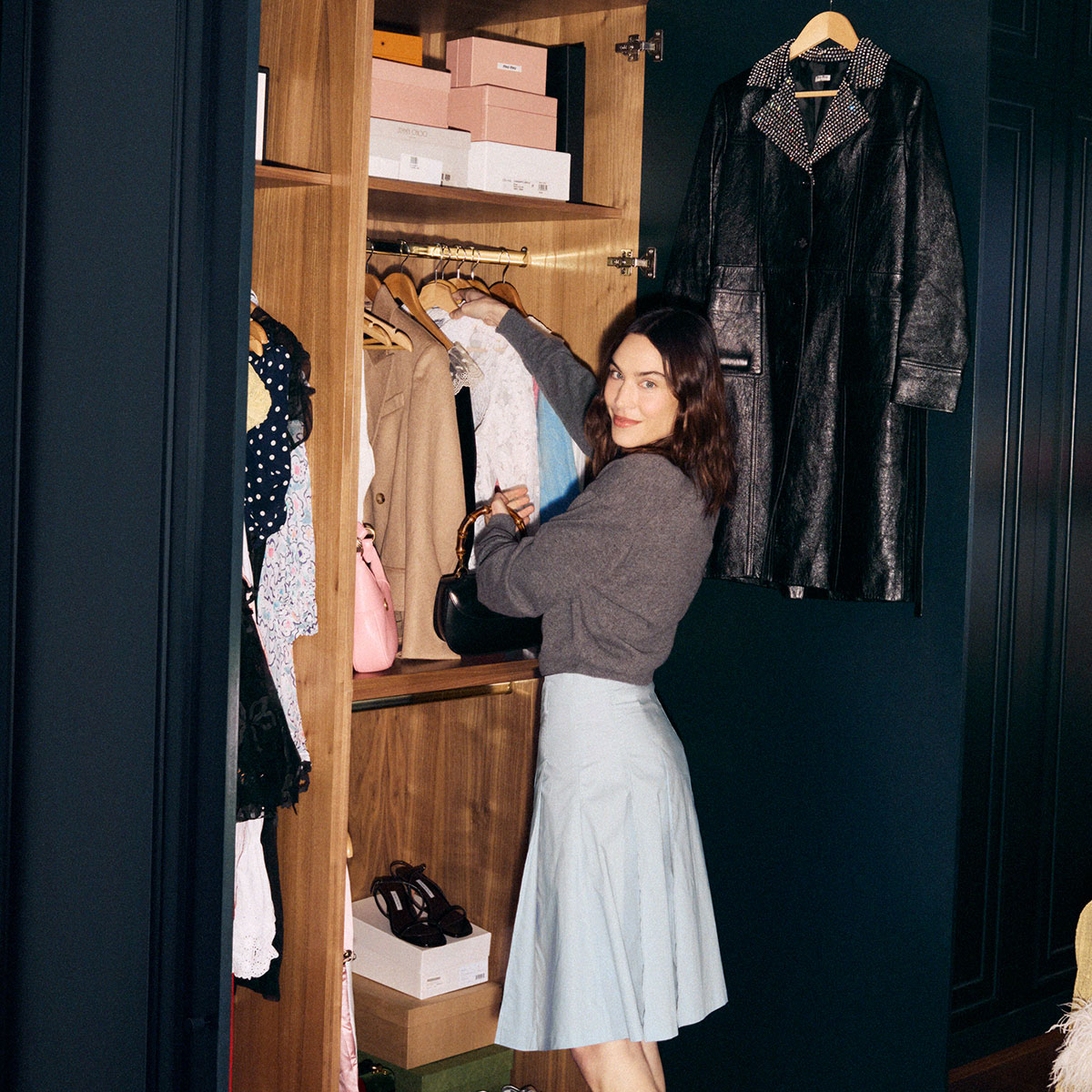 This is not a drill: you can now shop Alexa Chung's actual wardrobe on Vinted
This is not a drill: you can now shop Alexa Chung's actual wardrobe on VintedOwn a piece of sartorial history
By Penny Goldstone
-
 New Look’s spring collection has dropped—as a picky fashion editor, I’m seriously impressed
New Look’s spring collection has dropped—as a picky fashion editor, I’m seriously impressedSpring trends at affordable prices
By Jazzria Harris
-
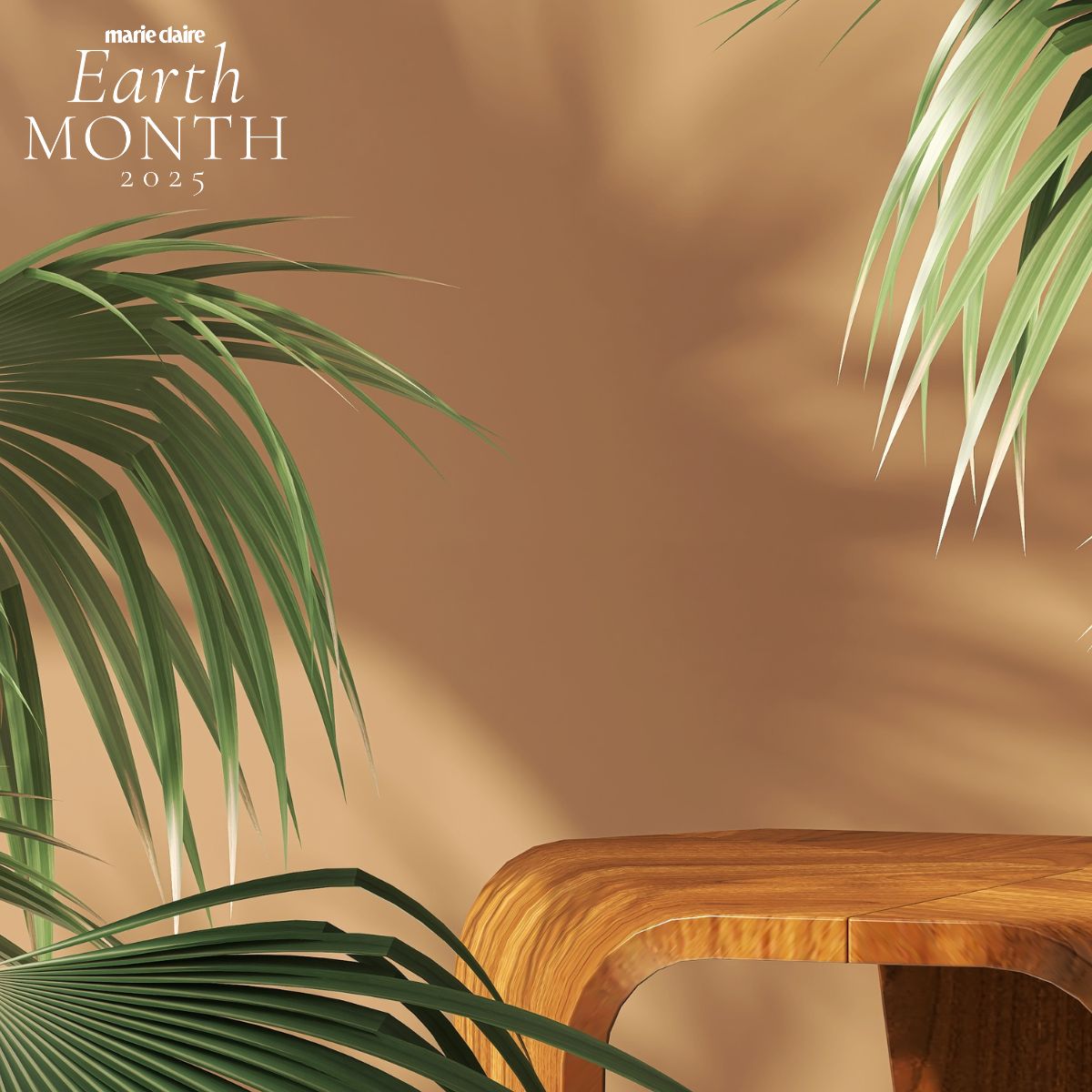 I'm the founder of an ethical brand marketplace - why, in the wake of tariff-gate, protecting independent businesses is more important than ever
I'm the founder of an ethical brand marketplace - why, in the wake of tariff-gate, protecting independent businesses is more important than everThis Earth Day, the founder of Wolf & Badger shares why protecting sustainable brands is so pivotal.
By Ally Head